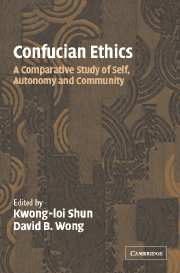Book contents
- Frontmatter
- Contents
- Contributors
- Contributors
- Introduction
- SECTION I RIGHTS AND COMMUNITY
- 1 Are Individual Rights Necessary? A Confucian Perspective
- 2 Rights and Community in Confucianism
- 3 Whose Democracy? Which Rights? A Confucian Critique of Modern Western Liberalism
- 4 The Normative Impact of Comparative Ethics: Human Rights
- SECTION II SELF AND SELF-CULTIVATION
- SECTION III COMMENTS
- Glossary of Chinese Terms
- Index
2 - Rights and Community in Confucianism
Published online by Cambridge University Press: 08 December 2009
- Frontmatter
- Contents
- Contributors
- Contributors
- Introduction
- SECTION I RIGHTS AND COMMUNITY
- 1 Are Individual Rights Necessary? A Confucian Perspective
- 2 Rights and Community in Confucianism
- 3 Whose Democracy? Which Rights? A Confucian Critique of Modern Western Liberalism
- 4 The Normative Impact of Comparative Ethics: Human Rights
- SECTION II SELF AND SELF-CULTIVATION
- SECTION III COMMENTS
- Glossary of Chinese Terms
- Index
Summary
INTRODUCTION
There is an interesting turn toward Confucianism in much U.S. scholarship on Chinese philosophy. Heiner Roetz, in a recent book on Confucian ethics, detects certain frequently recurring themes in this scholarship. Quoting and paraphrasing from authors such as Herbert Fingarette, Henry Rosemont, David Hall, and Roger Ames, Roetz summarizes the themes in the following way:
China can teach us to recognize that the mentality of self, autonomy, and freedom has run its course. Together with the Chinese, we should recall our “communal rituals, customs, and traditions” and “inherited forms of life.” We should abandon the “myth of objective knowledge,” and adopt a “thinking that avoids the disjunction of normative and spontaneous thought.” Confucius especially presents us with a model which for our world is perhaps “more relevant, more timely, more urgent” than it has been even in China herself.
Roetz criticizes the line of thought he finds in these authors for its apparent paradoxicality: the criticism of negative developments within Western society presupposes general normative criteria, yet the allegedly better model – Confucianism – is deployed to argue for a “contextualism which is no longer interested in questions of right and wrong, or relativity and objectivity.” Furthermore, Roetz argues that context and tradition sanctified foot-binding in China, widow burning in India, and slavery in the United States. Roetz asks, “How can we criticize the unspeakable injustice inflicted upon man in the name of traditions and contexts if we leave the final say to both and abandon any ethical reserve?”
- Type
- Chapter
- Information
- Confucian EthicsA Comparative Study of Self, Autonomy, and Community, pp. 31 - 48Publisher: Cambridge University PressPrint publication year: 2004
- 17
- Cited by



